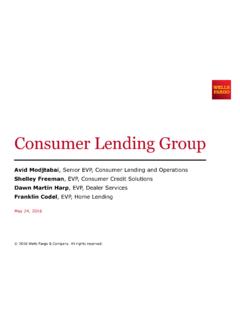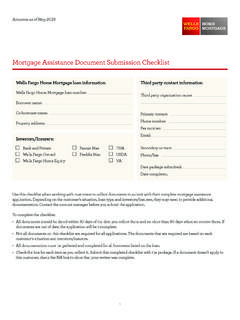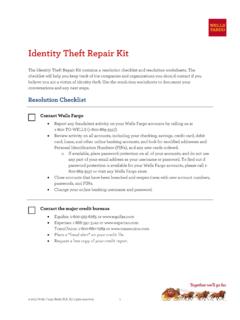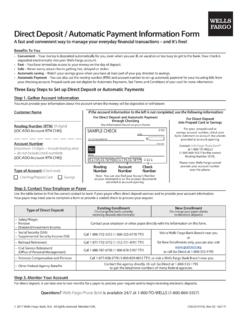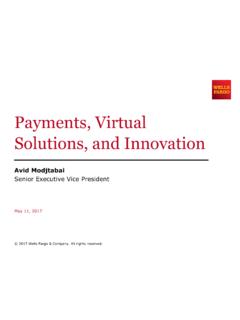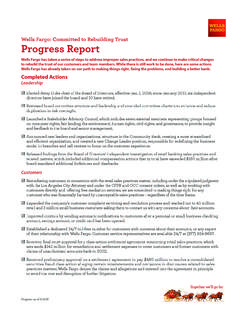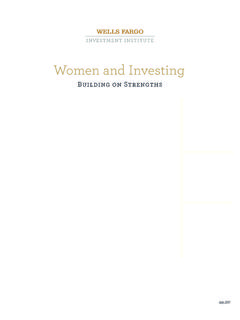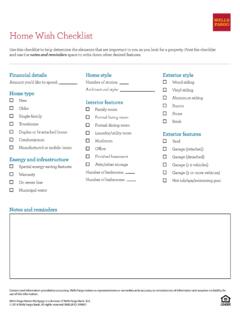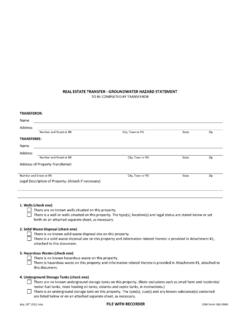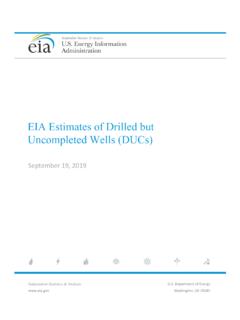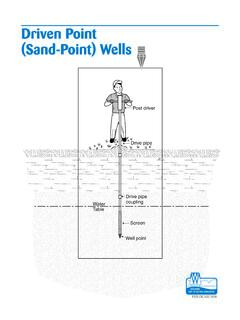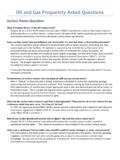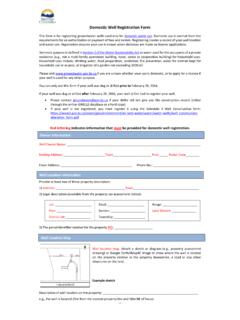Transcription of Transfer on death designations: Advantages ... - Wells Fargo
1 Advice and Planning Update Transfer on death designations : Advantages and disadvantages FEBRUARY 2022 Advice and Planning Offered through Wells Fargo Bank, Key takeaways: Transfer on death (TOD) and payable on death (POD) designations can be useful methods of transferring assets to heirs when used in conjunction with a well thought-out estate plan. Periodically reviewing the titling and beneficiaries of your accounts and assets, especially when you update your estate plan, may be helpful. Even with the best intentions, a disconnection can happen between how you own your assets and your intended plan when your wishes or circumstances change. Proper implementation of your estate plan, including coordinating your asset titling, can be essential to achieving your intentions and avoiding unintended consequences.
2 What this may mean for you: Now is the time to review the titling of your assets, including beneficiary designations , to help achieve your wealth Transfer goals. Investment and Insurance Products are: Not Insured by the FDIC or Any Federal Government Agency Not a Deposit or Other Obligation of, or Guaranteed by, the Bank or Any Bank Affiliate Subject to Investment Risks, Including Possible Loss of the Principal Amount Invested2 Whether you have a current estate plan, have an old one in need of an update, or intend to start the process tomorrow, an important consideration is proper asset titling. There are various components to titling; one is using a Transfer on death (TOD), generally used for investment accounts, or payable on death (POD) designation, used for bank accounts, which acts as a beneficiary designation to whom the account assets are to pass when the owner dies.
3 Similar to naming beneficiaries on retirement accounts (IRA, 401(k), and insurance policies), accounts with TOD and POD designations are not subject to probate. For some people, it may be effective to add POD/TOD designations for a specific purpose. However, for many families, this simple way of passing assets to heirs may have unintended consequences. This update explores some of the potential Advantages and disadvantages of POD/TOD designations and pitfalls to consider. TOD/POD Advantages : Beneficiary designations , such as POD/TOD, are simple to implement, generally have no cost associated, and allow the account to Transfer to your named beneficiary relatively quickly. Upon the account owner s death , the beneficiary provides the death certificate and identification to the financial institution to receive the funds.
4 For qualifying accounts, additional FDIC Insurance may be attained by having several bank accounts, each with a different title, including varying the named POD beneficiaries on each account. Avoidance of the probate process because the account transfers directly to the beneficiary by contract, not through a will. For jointly held assets, such as a home or account that is Joint Tenants with Right of Survivorship, upon one joint owner s death , the surviving joint owner will retain the asset until their death , at which time the named POD/TOD designee would receive it. TOD/POD disadvantages: If you update your estate plan and forget to update your POD/TOD beneficiaries, you may risk not achieving your wishes for your heirs.
5 For any administrative costs or estate taxes due, assets that pass by TOD are not included in a pro rata portion of those expenses. For example, if one child receives your investment accounts by TOD and another child receives your residence by will, the latter may not have sufficient liquidity to pay for their pro rata share since the TOD accounts are not included in the calculation. During your lifetime and after death , TOD assets are legally subject to your creditors' claims. Although these accounts pass directly to the beneficiary and do not go through probate, if the executor does not have enough probate assets to pay the debts of the estate, creditors are entitled to claim some non-probate assets, including TOD accounts.
6 While this may be difficult for creditors to do, if they have sufficient motivation, it is an option they may pursue. In addition, when the beneficiary receives the assets, the assets then have no protection from a lawsuit, creditors, divorce, or other claims like they would if the assets were held in a trust. Examples of how your plan could be inadvertently derailed with TOD designations : Tax-efficient planning If you have a large estate (above the federal estate tax exemption amount), the tax issues can be concerning. When you have provisions in your documents to divide your estate by funding credit shelter trusts, marital trusts, and/or generation skipping trusts, passing assets outright to beneficiaries via TOD may mean that these tax planning strategies are not utilized to their full potential, resulting in an inefficient use of exemptions and possible loss of creditor protection.
7 Even with modest estates, plans 3 often include the ability to disclaim assets for added flexibility and the opportunity to implement a proper post-mortem plan may be beneficial to your family. However, if the accounts pass outright through a TOD provision and the heir receives benefits from the assets, the ability to properly disclaim may be lost. When you change your mind At some point in the future, you may think differently about how you d like to make gifts to your heirs and philanthropic causes. When your goals and interests evolve, it is important to update your estate plan, but it s easy to forget about the importance of updating your asset titling as well . Therefore, if you have TOD designations , and those are not updated, your wishes may not be aligned with your estate distribution.
8 When your circumstances change If you have an unexpected illness or disability and you need to access the TOD account funds to cover medical bills, you may inadvertently diminish the amount those heirs were to receive or disinherit a beneficiary by exhausting the funds. Unknowingly causing some heirs to receive a greater portion of your wealth than others can add undue stress and discord to family relationships. What is the right choice for you? Your family has its own individual structure and set of values and goals, and the implementation of your estate plan needs to be coordinated in many ways, including the titling of assets. Work with your advisors and tax and legal professionals to consider your estate plan when opening new accounts or acquiring, divesting, or gifting assets.
9 This may present opportunities to avoid potential headaches and heartaches down the road. Source: Understanding Deposit Insurance, htt ps://www. deposit/de posits/ Disclosures Wells Fargo & Company and its affil iates do not provide legal or tax advice. In l imited circumst ances, tax advice may be provided by Wells Fargo Bank , Ple ase consult your legal and/or tax advisors to determine how this information, and any planned tax results may apply to your situat ion at t he time your tax ret urn is filed. Wells Far go Wealt h and Investment Management (WIM ) is a division within Wells F ar go & Company. WIM provides financi al products and services through various bank and brokerage affil iates of Wells F ar go & Company.
10 The private Bank offe rs products and services through Wells Fargo Bank, N. A., Member FDIC, and its various affiliates and subsidiar ies. Wells Far go Bank, N. A. is a bank affil iate of Wells Fargo & Company. Wells Fargo Bank , offers various advisory and fiduciary products and services including discretionary portfolio ma nagement. Wells Fargo affiliates , including Finan cial Advisors of Wells Fargo Advisors, a separate no n-bank affiliate, may be paid an ongoing or o ne-ti me referral f ee i n rela tion to cl ients referred to th e bank . The bank is respo nsible for the day-to-day manag ement of the a ccoun t an d for provid ing i nves tment advi ce, in vestmen t managemen t s ervices and weal th mana gement servic es to cli ents.
